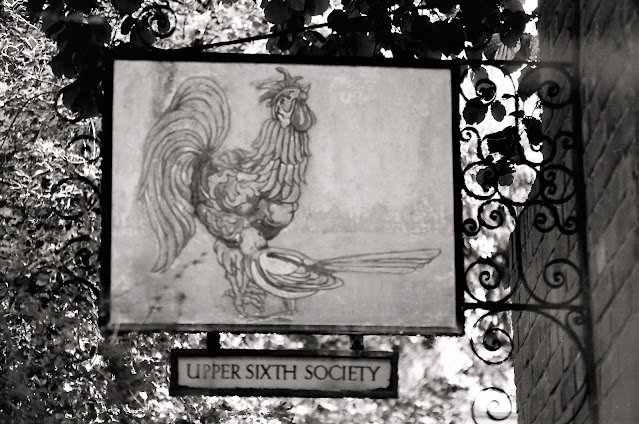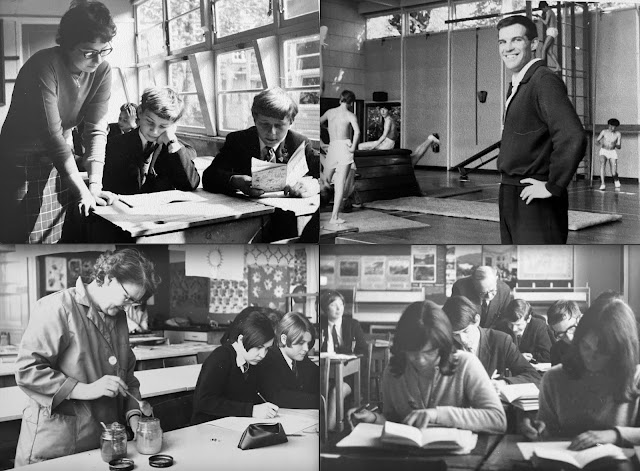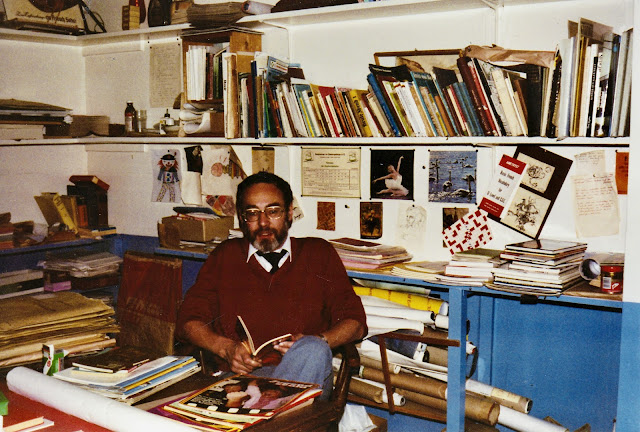1968-70 and memories of LVI and UVI
This article marks the conclusion of Stephen Willoughby's wonderful recollections of life at the Gilberd. I'm very grateful to Stephen for taking the time to commit all his memories to 'print'. He has really captured an image of the school during the 1960s that I'm sure many visitors to this site will recognise and appreciate.
We'll be staying in the 1960s next week as several issues of 'The Gilberdian' will be available to download, courtesy of Mike Springett. For now though it's over to Stephen for an account of his final years at the school...
On my return to school in September 1968 I found myself in Lower Sixth group LVI ( C ), together with 20 others, where I had elected to take a standard combination of subjects: Maths, Physics and Chemistry. Maths and Physics were further subdivided as follows: Pure Maths taught by Mr “Dumpy” Denham; Applied Maths, by Mr Norman Broom; Physics (Heat and Light), Mrs Rees; Physics (Magnetism and Electricity), Mr “Dobbo” Dobson. Mr Bernard “Bernie” Crowther took us for Chemistry. General Studies was also on the timetable and in which I was apparently a “useful member of the film group”, although I have no memory of that. Mr Cook was our form tutor, and I believe Mr Butcher acted as Head of LVI.
As far as I recall, school uniform was still compulsory for this first year. I think prefects were issued, or could purchase, a special tie which was plain green and carried a small cream-coloured spread eagle Gilberd insignia. It might have been available to everyone - my contemporaries might remember more about this.
For the first time in our school careers we had “free” sessions on our timetables intended for private study, and a row of tables was set up on the top floor of the main building, by the Art studios, for that purpose. I’m afraid to say that Mrs Day’s smoking den at the back of her shop was often a more attractive option.
Several of my teachers were new to me. Mr “Dumpy” Denham was an interesting man, having been a navigator during the Dam Busters raid in 1943. Unfortunately, Dumpy had suffered a stroke which affected his speech to some extent, but he was very sharp in his mathematical ability, and also in his knowledge of astronomy. I believe he had a daughter at the school in one of the lower forms. Mr “Bernie” Crowther was a very knowledgeable chemist who communicated the subject well and with enthusiasm. He was also a Christian Evangelist, an aspect of his life which he kept quite separate from his teaching. Bernie was known to have a close friendship with one of our contemporaries, and I have since learned that they subsequently married. Mr “Dobbo” Dobson continued to mend his colleagues’ electrical appliances, regale us with tales from Raymond Chandler’s novels, and sneak into the prep lab for the occasional cigarette as before.
The LVI was the year in which I think many of us were easily distracted: the A-level exams seemed a long way off, and some of us were working hard to impress newly-acquired boy/girl friends. That was certainly true in my case (I had recently started seeing a girl, later to be my wife, from the High School), with the added complication of rehearsing for a series of concerts scheduled for the summer. This was a hugely ambitious initiative set into motion by some students at the Grammar and High schools, to me much more rewarding than any amount of Physics or Maths! This cross-fertilisation between the schools was very good for us all, I think.
The following year we became the UVI and, with it, members of the Cock & Pye Society. The Cock & Pye had been a 17th century pub adjacent to the main Gilberd site on North Hill. I don’t know if the school owned the building, but it certainly had the use of its rambling rooms set over two floors and of the courtyard at the back. The rooms were furnished with old sofas and armchairs which might have been sourced from rummage sales and the like, and became common rooms to which each of us was allocated in form groups. The building had its own kitchen and separate dining area which was attended to by a lovely lady called Rita (who happened to be one of my mother’s friends.) I think this is the year when school uniform no longer applied to the sixth form, so we were able to choose our own attire as long as it conformed to a dress code. Mr Wolfendale was my form tutor, and the Head of UVI was Mr “Fusser” Austin, who earned his nickname from being very particular in the way he expected the Cock & Pye Society to be run.
As the most senior students in the school, many of us were given additional responsibilities such as prefect, head of one of the school years, captain of a sports team, secretary of a society and so on. I was appointed Head Boy of the Lower School, as well as being a prefect, and secretary of the Upper Sixth Society. I can’t say that I carried out any of these responsibilities particularly well, but they looked good on my UCCA (University Central Council on Admissions – the precursor to UCAS) form.
Mock exams were held in January followed by a parents’ evening in March. The less said about those in my case, the better! UCCA applications resulted in visits to potential universities or other HE establishments for interview, followed by the hope of provisional offers.
It was during our time in the UVI that some of the newly-appointed and younger members of the teaching staff encouraged us to engage in informal and animated discussions of a political nature, to raise our awareness of topical issues, and so on. A parent of one of my friends was a long-standing teacher at the school, and I learned through this back channel that some of the more established teachers were less than enthusiastic about these developments. I believe, even by 1970, the female and male teachers still had separate staff rooms in the main building.
Visiting the local pubs at lunchtimes was made easier by not having to wear school uniform (by this time, most of us were 18 anyway). I should add that this wasn’t a frequent occurrence, but it has to be said that afternoon lessons didn’t always get the attention they deserved! Mrs Day’s continued to be the unofficial Common Room for many of us, and in which many packets of “No. 6” were smoked over the years.
The summer of 1970 brought the challenge of A-levels and everything that went with them, after which we said our farewells to our teachers and peers before drifting away. I found it to be a desultory and unsatisfying way to end seven years at the Gilberd, starting as a child and finishing as a young man, but it had to be that way. It was a happy seven years, and I have much to thank everyone I encountered there – friends, teachers, ancillary staff – for a wonderful experience.
Postscript: I ended up at Queen Mary, University of London, where I studied Chemistry and supporting subjects, before becoming an analytical chemist in the oil industry for a year. I then returned to QM to do a PhD in Organometallic Chemistry under Prof Michael Mingos. I later joined the teaching staff at the sixth form college in Basingstoke, where I worked for 15 years. A change in direction took me into the IT industry where I specialised in public information systems, while also lecturing in the Open University, until my retirement in 2017. I now live in Diss, so Colchester is still relatively local!




Comments
Post a Comment